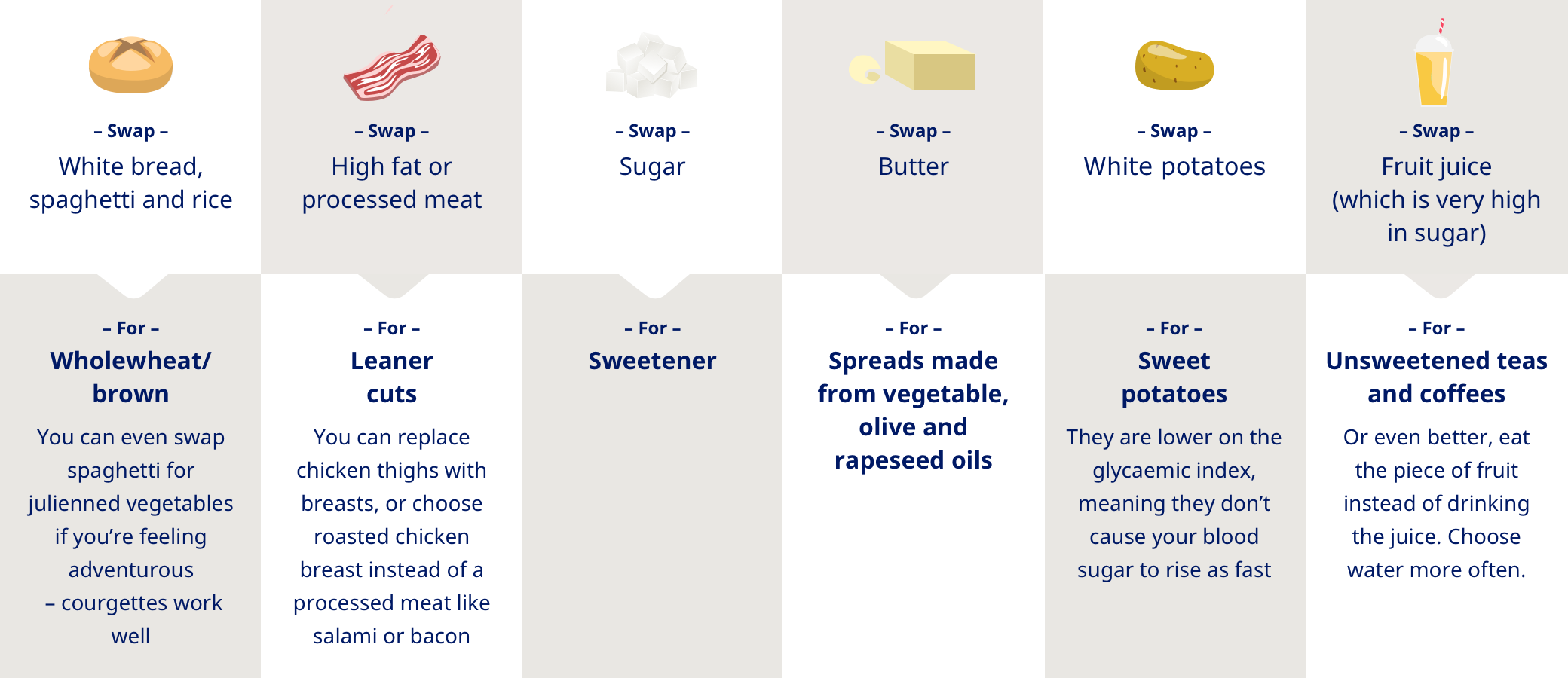Food plays a central role in how we feel and function, and this is especially true when it comes to diabetes.
A thoughtfully designed diabetes-friendly diet goes beyond simply cutting out sugar; it’s about understanding how different foods affect the body and making choices that support diabetes management, encourage a healthy eating plan, stable energy, balanced nutrition, and the best eating plan for long-term wellbeing1. By approaching meals with balance and awareness, it’s possible to enjoy variety and flavour while supporting healthier blood sugar control.
A diabetes diet is not about following a restrictive plan or cutting out certain foods or entire food groups. Instead, it’s a flexible way of eating that supports diabetes care, helps manage blood sugar levels, and can help improve health outcomes along with other diabetes medicines and treatments. The main goal of a diabetic diet is therefore to make food choices that stabilise glucose levels, reduces the risk of complications, and promotes long-term wellbeing1.
At its core, a healthy meal plan for diabetics focuses on how to effectively plan meals by:
Understanding food labels and what to check for is an important part of meal planning for a diabetic diet1.
Carbohydrates are particularly important to monitor as they have the biggest impact on high blood glucose levels1. Choosing the right type and quantity of carb foods, including protein foods, lean meats and foods high in fibre, is key to maintaining a healthy diet1. Good sources of carbohydrates include:
On the other hand, refined carbs and sugary foods - such as sweets, pastries, white bread, and fizzy drinks - as well as saturated fats should be limited. These cause rapid spikes in blood sugar levels and provide little nutritional value1,2.

The food we eat is directly linked to how our blood sugar levels fluctuate. When digested, carbohydrates are broken down into glucose, which enters the bloodstream and raises blood sugar levels. This process is particularly critical for individuals with diabetes, as well as those with certain digestive and kidney diseases1. For people living with diabetes, understanding this process is especially important, particularly when considering insulin use and the role of physical activity in managing blood sugar3.
When thinking about the relationship between carbohydrates and blood sugar, it's important to remember that:
The glycaemic index is a scale that measures how quickly foods raise blood sugar. Here are some common examples of high and low GI foods:
Choosing low-GI and other healthy foods not only helps avoid blood sugar spikes but also offers various health benefits and keeps levels more stable, while also being mindful of cholesterol levels4.
Even healthy foods can raise blood sugar if eaten in excess, emphasising the importance of "counting carbs". Controlling portion sizes is crucial, especially for carb-rich meals and determining how much insulin to take. Pairing carbohydrates with protein, fibre, and healthy fats also helps slow digestion and leads to more stable blood sugar throughout the day1,3.
Snacking can be part of a healthy diabetic diet if done wisely. The key is to choose foods that provide steady energy, rather than causing sudden sugar spikes3.
Snacks like chocolate bars, crisps, or sweetened granola, and drinks like fruit juice that often contain added sugar should be avoided, as they cause sharp rises in blood sugar. Instead, focusing on nutrient-dense diabetic foods such as whole fruits, that help keep you satisfied and stabilises glucose levels between meals1.
Meal planning and following diabetes-friendly recipes are two of the most effective approaches for managing diabetes. By following a few simple guidelines, it becomes easier to maintain a healthy, enjoyable, and sustainable diet tailored for individuals with diabetes.
Try meal prepping
Preparing meals ahead of time ensures healthy options are always available, reducing the temptation of grabbing processed foods. Batch cooking whole grains, roasting vegetables, and portioning lean proteins makes weekday eating easier1.
Use the plate method
The plate method is a simple, visual way to balance meals:
This method makes portion control straightforward and helps avoid overeating5.
A diabetic diet doesn’t have to be complicated or restrictive. By focusing on balanced meals, controlling carbohydrate intake, and prioritising whole nutrient-dense foods, you can manage blood sugar effectively and support long-term health. Whether at home or dining out, making small, consistent food choices builds a sustainable approach that benefits both body and mind.
Yes, you can still eat out with diabetes. A good idea is to choose grilled, baked, or steamed options, and ask for sauces on the side. Opt for lean proteins and non-starchy vegetables instead of fried or starchy foods. Be mindful of portion sizes, and don’t hesitate to ask for modifications. With a little planning, dining out can still be enjoyable and diabetes friendly.
As a diabetic, it’s best to avoid foods that can cause rapid spikes in blood sugar. This includes sugary snacks and beverages like sodas, candy, and pastries. Also limit refined carbohydrates, such as white bread, white rice, and pasta, as they are quickly broken down into sugar. Fried foods, high-fat meats, and foods rich in saturated or trans fats should also be limited, as they can increase the risk of heart disease.
A good breakfast for a diabetic diet includes protein, healthy fats, and fibre-rich carbs to help keep blood sugar steady. Some great options are scrambled eggs with spinach, a whole grain toast with avocado, or a Greek yogurt with berries and a sprinkle of chia seeds. You can also try oatmeal with nuts and a small portion of fruit. Avoid sugary cereals or pastries, as they can cause blood sugar spikes.
HQ25DI00248
